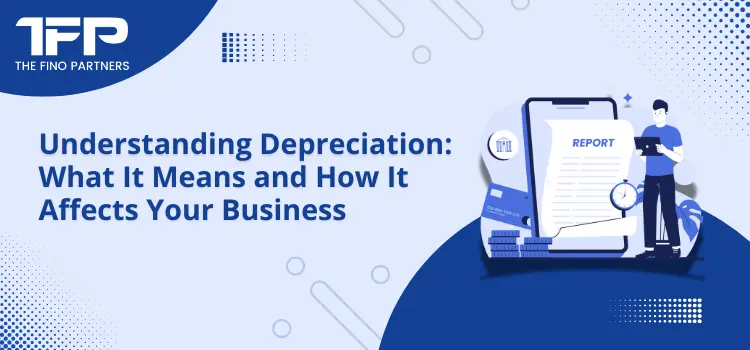Depreciation is a crucial part of sustaining businesses. But many businesses find it hard to comprehend how to manage it effectively. It depicts how the value of assets decline over time as a result of damage or any other haphazard. It helps businesses to spread out the cost of the acquisition over a period of time rather than reporting the entire sum in the year of purchase. Businesses should prioritise understanding depreciation as it affects the overall finances of the business. It affects your tax obligations, profitability and financial statements. This essay will discuss depreciation, its various calculations, and how it affects the financial success of your business.
The Key Concept: What is Depreciation?
- Depreciation is an accounting technique that allows businesses to cut costs of acquisition over the span of the longevity of the goods. These goods can include machinery, cars, infrastructure and many more.
- Assets lose value with age, whether due to their physical condition or the arrival of newer, advanced technologies.
- Depreciation is a tool used by businesses to precisely document their profit and loss figures in their financial statements by representing this value drop. Depreciation serves a couple of purposes:
- It gives a precise picture of the worth of an asset at any particular time.
- It aids businesses in aligning an asset's future earnings with its purchase price.
- Depreciation enables you to subtract a portion of the cost of a delivery vehicle that your business pays $60,000 for, say, if it will be used for six years. It allows you to pay $10,000 annually over the six years. Rather than reporting the whole $60,000 at the time of purchase. This helps in determining the financial standing of your business accurately.
The Ways to Move Forwards: Methods of Depreciation
There exist various methods for calculating depreciation, each providing an individual method for paying the cost of buying an asset all through its useful life. The strategy you use depends on a number of factors, including the asset's type, expected use, and industry standards.
- Depreciation in a Straight Line:This is the most simple and prevalent approach. It evenly distributes an asset's cost all through the duration of its useful life. A $50,000 machinery would be depreciated by $5,000 a year if its displayed lifespan was ten years. For commodities that lose value continually, this strategy works well.
- Depreciation of Declining Balance: Under this expedited method, depreciation is written off more during the first few years of the lifespan of an asset than it is during the following years. For example, if you depreciated a $50,000 asset utilising a 20% declining balance, your depreciation in the first year would be $10,000, and in the second, $8,000, and so forth. This method takes into consideration the fact that many assets, like automobiles, lose greater value in the initial stages of ownership.
- Units of Production Depreciation: This approach bases depreciation calculation on asset utilisation as opposed to time. If a machine has the goal of manufacturing 100,000 units during its service life but only succeeds in producing 20,000 in that first year of operation, then twenty twenty percent of the price of the asset would be depreciated. For businesses where production rates correspond precisely with asset wear and tear, this method is perfect.
- Depreciation in Sum of the Years' Digits: Sum-of-the-years' digits is another rapid depreciation method that allocates a greater percentage of the asset's cost to its early years of life. Every year, the amount of depreciation decreases. It is usually used to assets that have a long operational life but lose most of their worth quickly.
The Many Influencing Factors: Impact of Depreciation On Your Business
Depreciation impacts an array of the activities of your business, including
- Tax Deductions: There are several tax benefits to depreciation. IRS suggests that businesses can get taz exemption and thus mitigate tax liabilities by subtracting depreciation costs from the profits. Small businesses can achieve high levels of profit by leveraging depreciation.
- Financial accounts: Accurate financial accounts are laid out through the use of depreciation. Depreciation helps to prevent a big one-time expense that could skew your statement of profits and losses by spreading out the cost of assets over time. It evens out expenditures and guarantees that the financial health of the business is more properly reflected in your financial reports.
- Managing the cash-flow: Since depreciation is a not in cash item, it has no effect on your cash flow instantly. However, through tax savings, it improves cash flow indirectly by reducing taxable income. Effective management of depreciation allows businesses to save capital for future investments or business tasks.
- Many ways to manage assets: Depreciation helps businesses with tracking the value of their assets. The value of the book of assets can be revised on a regular basis to assist you make educated choices on maintenance, enhancements, and replacements. This aids in capital expenditure planning too.
- Metrics of Profitability: Key economic variables like profit margins and return on assets (ROA) are significantly affected by depreciation. Even in instances in which your business is producing excellent cash flows, high depreciation expenses might reduce profits on paper. Presenting the financial health of your business to lenders and investors needs an understanding of the way depreciation affects profitability indicators.
Conclusion
Managing a stable financial health depends on how well your business handles depreciation. It is more than an accounting term. Businesses can improve tax efficiency, profitability and long-term asset management with the help of depreciation. Businesses should understand depreciation and how to calculate it as it affects the overall financial climate of your business. Managing depreciation well can lead to informed decision making, healthier cash-flow and long-term financial sustainability. And the next best partner you can look for to manage depreciation for your business is Fino Partners. Outsourcing accounting services to our competent hands will ensure a sure ride to success.




























